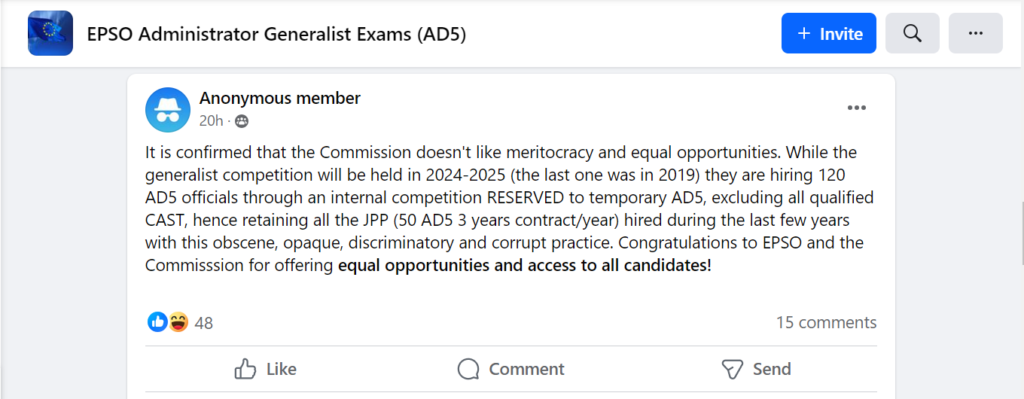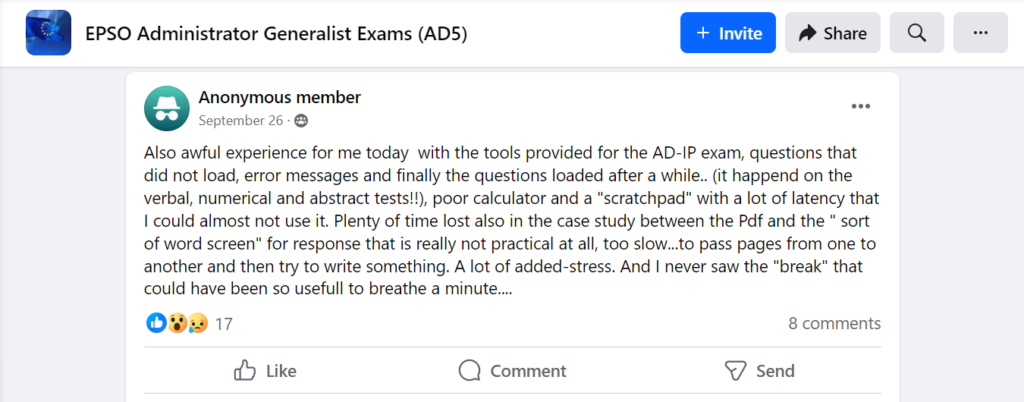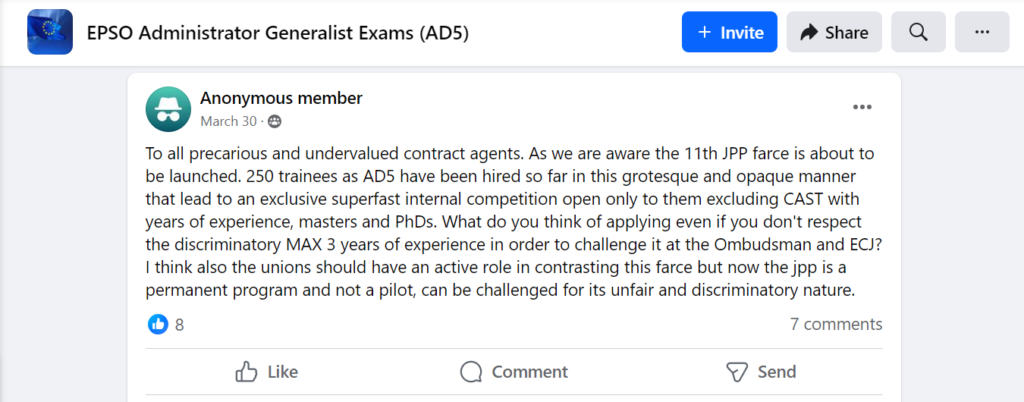The European Union is a vast organisation, in constant need of employees. Its institutions (not only the main institutions, but altogether 76 institutions, bodies and agencies) employ tens of thousands of individuals, with the exact number hard to be determined. A simple Google search brings around 60.000 employees, while a recent, more elaborate and detailed research (based on the most recent annual reports from each of those European Union institutions and bodies) brings the current number close to 80.000 employees. This army of employees is organised in various ways and some parts of that are – or should be – focusing on providing opportunities for young experts.
During the past decades, “European civil service” has become a reality. What is often referred to as just “Brussels bureaucracy” (very similar to its over-the-sea parallel, the “Washington bureaucracy”, both terms being mostly used by local populist political forces, usually failing to distinguish between political decision-makers and professional employees of the executive) is an employment system, which is practically a supra-national, European version of the employment systems that all EU member states operate for themselves. While designing, developing and operating it, the EU is in a somewhat lucky situation to have the possibility to learn from those on the level of member states, learn from their experience, avoid the shortcomings and occasional mistakes (while making its own ones, of course) and to have the chance to offer a somewhat better remuneration than most of the members states. All that has turned the EU into a popular potential employer not only to those who are interested in public service but also to everyone willing to work in a pro-European, multicultural environment, turning Brussels into a vibrant place, attractive to young people from all over the continent – and here we need to emphasise the presence of those from newer, eastern EU member states, in the case of whom the vast difference in salaries compared to their potential home earnings is a significant factor.
A recent article by Politico has also tried to get the profile of the typical “senior figure” as well, concluding that the a current “senior figure” in the “EU bubble” is a 57-year-old man with at least two degrees, one in law, with a rich variety of nationalities and professional background. It was concluded based on an analysis of a unique dataset on the educational background of more than 600 EU officials and members of European Parliament, from publicly available sources. While this is interesting information, this analysis has not been targeted on young experts currently working to the EU – still it can be relevant to potential development of the current youth to senior positions.
Employment structure
Permanent employment
Based on the current rules, the EU operates with various employment and staff categories: the “core” category is the permanent officials, but there are individuals employed on a contractual or temporary base, there are seconded national experts from member states, trainees in various programmes and others.
The backbone of the “European civil service” are members of the permanent staff. That means an appointment for an indefinite time to one of the following three categories: administrators (AD), assistants (AST) and secretaries/clerks (AST/SC).
The duties of administrators require knowledge and experience in various fields of activities of the EU as they include developing policies and legislation, conducting analysis, advisory etc. Their career level (and their salaries accordingly) is graded from AD 5 to AD 16, with AD 5 being the entry-level grade for university graduates, while AD 15-16 grades are the executive top positions. It is also possible to start a career at AD 6-7 levels with candidates having several years’ relevant educational background or work experience. AD 9-12 are middle management posts, where previous management experience is needed.
Those working as assistants, are typically engaged in an executive or technical role, providing support to the work of administrators in all fields of activity. An assistant’s career – similarly to administrators – is organised into grades, from AST 1 to AST 11, with new employees usually entering at grades AST 1-3.
Secretaries and clerks (the so-called “support staff”) are generally responsible for office management and for providing support of administrative and technical nature. Some examples of their activities: finalising documents and files, organising meetings and travels, compiling and disseminating information – anything that is needed. Their careers range from grade AST/SC 1 to AST/SC 6, new employees usually entering at grades AST/SC 1-2.
Permanent employment is usually attractive to most individuals as job security is something that everybody wants to achieve – while young employees may have other priorities. Trying different positions, tasks, challenges is something that e.g. millennials are usually opened to. At the same time, You see younger (temporary) employees of the various EU institutions trying to get into a permanent position, looking for opportunities and chances to do so.
Fixed-term contracts
Contract staff are responsible for various manual and administrative tasks in fields, where an insufficient number of officials is available. It is common in activities not requiring constant permanent staff, but is often being used to temporarily “fill up” vacancies. This employment takes the form of a fixed-term contract, being possible for the term of maximum 6 years with any EU Institution, but in some cases these contracts may have an indefinite duration. Permanent positions are usually more popular for employees (as usual in the world of labour), but under some circumstances, the fixed-term nature may be beneficial to both parties.
Recruitment of contract staff has two major ways:
- via the CAST Permanent procedure or
- via an ad hoc selection process.
ad 1) CAST (Contract Agents Selection Tool) Permanent means an open-ended procedure without any application deadline. CAST Permanent positions are available for a wide range of job profiles, while candidates apply for the profiles and not for specific jobs or positions.
ad 2) It is possible to recruit staff to fill specific positions via ad hoc contract staff vacancies. In this case, application deadlines are set for each vacancy.
Regardless of the recruitment method, candidates successfully obtaining a contract are employed for a fixed amount of time (while the practice is, that in some EU bodies and agencies, these contracts can be extended for an indefinite duration).
Similarly to permanent positions, contract staff positions are divided into four function groups, which practically stand for career levels:
- Manual and administrative support-service tasks (FGI)
- Clerical or secretarial tasks, office management and other equivalent tasks (FGII)
- Executive tasks, drafting, accountancy and other equivalent technical tasks (FGIII)
- Administrative, advisory, linguistic and equivalent technical tasks (FGIV)
Temporary staff
Temporary staff often seem to act as a temporary substitute for permanent positions, mostly administrators (even on higher levels) and assistants. Individuals are usually recruited into this category to fill current vacant positions within the institutions, bodies and agencies for a set amount of time. This time period may range from a few months to a few years, depending on the needs of the given body.
They may be required to perform any activities that is usually done by permanent staff, and they operate under the same grading system as permanent staff. This means that for administrator positions, temporary staff can be recruited at grades ranging from the entry-level grades AD 5-6 (or higher, depending on the circumstances and requirements), while assistant grades start at AST 1-3 (or higher, for more specialised profiles).
A vast proportion of the young employees of the various EU institutions work in temporary positions. Most of them have considered this opportunity as a “test run” or as an entry possibility, but most of them typically try to move towards permanent positions.
Seconded staff
Sometimes it is beneficial to all parties involved, that the EU “borrows” professional workforce from the public service of the member states. So-called Seconded National Experts (SNEs) are qualified civil servants from there, who “bring” their expertise to the EU for a fixed period of time, but they wish to keep their original positions within their own state.
They can be recruited by the EU institutions, bodies and agencies, whenever their unique skills are needed on any field. At the end of their period of secondment, these individuals gain a vast amount of experience related to the European Union, which then they take back to the public administration of their home state. This is not only beneficial to them on the individual level and to the member state, but also well contributes to the development of working relations and cooperation between the European Union and the respective member state.
Seconded experts are typically not young experts coming from the member states, and this is usually not intended to be an entry point to EU employment. But this tendency is not present all over in the EU, You can see different patterns from different member states.
Show me the money! How about the salaries?
The salaries offered by the European Union overall well stand the competition with most EU member states’ average wage levels in public service and come with additional allowances and other benefits. Usually, member states’ public sector wages are lower than those offered by the European Union, especially than those offered by central and eastern European member states – leading to a vast interest in these positions by young experts from this region. These are usually still lower than offerings by the private sector, but job security in public service is usually higher, with health care and pension schemes considered being better. The same advantages apply to EU employment as well.
Salaries are calculated according to the following. The so-called “basic salary” is based on the type of the contract, the grade and the step (one step usually equals 2 years in service) of the employee generally both for permanent and temporary officials. This given amount is adjusted annually in line with inflation and purchasing power, and also by a coefficient, depending on the place of employment, as working in different member states mean different costs of living.
The current amounts of salaries both for temporary and permanent administrators and assistants vary between around 3000 and 21.000 Euros, the first one being the lowest amount for a Grade 1/Step 1 assistant, the last one being a Grade 16/Step 5 administrator. The salary for contract agents start from a bit over 2000 Euros (FG I/Step 1) and raise to around 7000 Euros (FG IV/Step 5). The basic salary is supplemented by various allowances depending on personal circumstances of the employee (e.g. dependent child allowance, education allowances, pre-school allowance, expatriation or foreign-residence allowance etc.). You can check detailed numbers here: https://eur-lex.europa.eu/legal-content/EN/TXT/?uri=CELEX%3A52022XC1214%2802%29&qid=1679484002331
How about taxes? While any salaries and allowances paid to EU employees are exempt from any taxation by any member states, those are still subject to a “European tax”, which is deducted from the salaries. These taxes cover social security contributions, pension, health insurance, etc. The final net salary is calculated by adding the relevant allowances to the basic salary and after deducting this tax. The amount of this tax depends on many factors, the progressive income tax varies between 8-45 %, a special solidarity levy is 6-7 %, and adding social security contributions to pension and health insurance, the amount in some cases may even rise over 50 %. According to data from the European Commission, the general average tax deduction for employees varies between 12-25 %.

Internships and traineeships – way for the youth?
Various institutions, bodies and agencies of the European Union organise various traineeship/internship programmes to offer (mostly) young people a chance to increase their experience, knowledge, professional skills and to expand their network and enhance their knowledge of the EU, which are usually deemed to serve as an entry point to EU employment. These are available in a wide range of fields: environment, law, human resources, data protection, communication, etc., depending on the institutions.
Internships programmes of the EU institutions, bodies and agencies are organised typically for five-six months and require participants to perform tasks similar to those of lower grade administrator staff, within the structure of the given organ, in conformity with its relevant provisions and conditions. The majority of these traineeships are remunerated, usually around 1.200 Euros per month, depending on the host organisation of the given traineeship programme. These programmes are published on the relevant website of the EU and on the website of the host organisation.
The advantages of these programmes are that they take young people closer to opportunities. They can gain insight and a deeper understanding of the respective organ and its activities. Additionally, by allocating time and energy to this personal development, these individuals do have clear advantages with the entrance competitions and in finding positions for themselves.
While internship and traineeship programmes seem to be the way to go to young people – and usually they do go – there is usually no age limit to these programmes, meaning that they are not specifically targeted on young experts.
Traineeships with the European Commission
The Bluebook Traineeship Programme is the main tool of the European Commission to recruit trainees.
It is offered by the European Commission and open to all EU citizens, regardless of age, while a limited number of places are also allocated to non-EU nationals. It requires at least BA level qualifications and to have no prior work experience of any kind with EU institutions. The programme has two legs, an Administrative Traineeship at any part of the European Commission and a Translation Traineeship with the Directorate-General for Translation (DGT).
The programme is offered twice in a year, applications are assessed automatically by the system. Nationality quotas are applied to EU candidates to ensure a proportionate representation. Candidates with the highest scores (around 3 000 successful candidates on every occasion, usually one third of the applicants) are included into the so-called Virtual Blue Book (VBB), where those candidates can apply for up to three traineeship positions. If all of those are unsuccessful, the candidate may still be selected by any other department whose posts have not been fulfilled during the selection rounds. The selected candidate receives the placement offer from the Traineeships Office. In case of rejecting it, the candidate will automatically be excluded from any future offers for that session. The positions are paid with around 1.250 Euros monthly.
Traineeships in the European Parliament
The European Parliament offers two types of traineeships: the so-called Schuman traineeships and traineeships with members of the European Parliament.
The Schuman traineeships are organised with the Secretariat, they are paid (around 1.500 Euros) and can be undertaken at any of the official seats of the Parliament (Brussels, Strasbourg or Luxembourg) or in its liaison offices in the various member states. It is supplemented by the so-called “Schuman Recruitment and Development Programme” which aims to help high performing Schuman trainees to find staff positions with the European Parliament after the completion of their traineeship. It ends up with successful candidates’ names and data being made available for contract agent positions and given priority at future recruitments – but without any obligation of the Parliament to choose them, which makes the programme something of an unkept promise.
Traineeships offered by the members of the European Parliament based on an agreement with the European Parliament take place at their respective offices in the premises of the European Parliament, their duration is usually between six weeks and five consecutive months, and is decided on by the host member of European Parliament. It goes with a monthly grant of between 800-1.400 Euros.
A “special” traineeship opportunity can also be offered by various members or political groups of the European Parliament. It is special as it has nothing to do with the EU itself, it is solely subject to the given parliamentarians or groups, and usually the recruitment is made on political or other non-professional aspects. It is even possible, that these are not even paid positions. However, these can still be interesting for young people interested in looking for a career with the European Union by simply just getting “close” to the institutions and gaining a deeper understanding of their operation.
Entry into employment by EU institutions
Employment shall be based on skill, knowledge and expertise, the employment procedure should be free from any nepotism and other bad practices. A skill- and knowledge-based entry procedure is needed, and the current European Union answer to this is the creation of the European Personnel Selection Office (EPSO) and the entry competition tests, the so-called concours.
The EPSO is responsible for processing around 45.000 applications a year for approximately 800 permanent positions. It also manages a database of over 70.000 registered candidates for approximately 600 contractual positions a year. EPSO is created and maintained as it is more efficient and cost-effective to have a single office for recruiting staff than to have each EU institutions, bodies and agencies organising their own recruitment procedures or competitions.
Competitions are the backbone of the selections process. These concours shall serve as objective evaluation tools of skills and knowledge of the candidates. After a successful competition, they are registered and made available for recruiters of the various EU institutions, bodies and agencies. They can also actively look for positions, as the successful competition is the condition of taking a starting, AD5 position.
This is where problems start. Recently, EPSO is being constantly criticized by many potential employees for its inconsistent practice related to competitions, bad technical background, and in general for the lack of opportunities. No AD5 entry exam has been published since 2019, and the newly planned one has been cancelled by EPSO, while no information was available, leading to general confusion and disappointment among participants.


Ideas to assist young experts
If the European Union wants to keep its current young workforce or/and is interested in attracting more of them, there are many things it can do.
The introduction of age quotas and age-specific programmes, re-thinking current traineeship opportunities would be of fundamental importance. Currently the EU – rightly – applies preferences with certain (vulnerable or from other reasons preferable) groups, there is no good reason at least not thinking about it related to young people. This is also acceptable to member states, a recent study has addressed the subject of youth quotas in for example various parliaments, and the results show that there is no serious resistance against the idea.
Based on current experience, re-structuring and proper funding of EPSO and the concours system is a must. The scandals of the recent time period (cancellations and delays of pre-set concours) and the following uproar with participants, all potential employees of the European Union have a killer effect on the credibility of the organisation and those send an extremely harmful message. Technical issues happen, to some extent they are accepted and tolerated, but there are certain limits to that.


The concours process shall be re-thought, the competitive exams should be organised better, with more transparent schedules and doing everything to avoid reschedules, which cause serious problems to many candidates trying to organise their preparation while possibly also working somewhere at the same time.
Finally, a very important issue is to assist current young employees in staying in the European Union. One good example to this goal is the European Commission’s Junior Professionals Programme (JPP), which targets the goal of better integrating junior staff from the Commission’s internal pool into the EU civil service. The two-year programme provides its participants (who shall have no more than three years professional experience with the European Commission, and Blue Book trainees are also eligible for it) with the necessary knowledge and skills to stay in the European public service. While the idea is commendable, there is strong criticism among staff related to the programme. Its lack of transparency has fed allegations, sometimes even conspiration theories that clearly work against its original goals, meaning that the direction might be good, but there are still a lot of work to be done.


